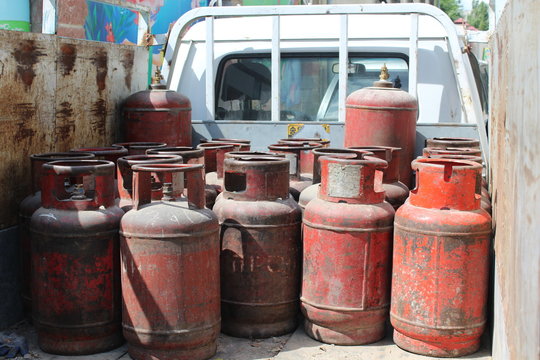Managing Leftover Propane

If you are a propane retailer, leftover propane can be more than just an inconvenience – it’s a valuable resource that, if handled correctly, can actually benefit your business. Whether the propane comes from customer returns, overstock, or routine maintenance, managing it effectively is crucial in order to avoid waste, improve safety, and even boost your bottom line. Here’s how you can handle leftover propane and turn it into an advantage for your propane business.
Safely Storing Leftover Propane
The first step to managing leftover propane is safe storage. Propane tanks must be kept in a well-ventilated outdoor area, away from direct sunlight and heat sources. Never store propane tanks in enclosed spaces, such as garages or sheds, where a small leak could cause dangerous conditions.
Regular inspections are necessary to ensure your tanks remain in good condition. This includes checking for rust, leaks, and any damage to the valves. Damaged tanks can lead to safety risks, but keeping them in top condition ensures they remain ready for use. Maintaining a precise inventory of how much propane you have left over and when it should be used in a business setting helps prevent stockpile mismanagement. An organized storage and tracking system can reduce the risk of purchasing excess propane and will help in planning future purchases.
Repurposing Leftover Propane for Business Use
Leftover propane doesn’t have to sit idle. Suppose your business uses propane-powered forklifts, heaters, or other equipment. In that case, you can repurpose any leftover propane in your daily operations. Redirecting this propane to fuel your equipment reduces the need to purchase additional supplies and minimizes wastage. Every gallon of propane used wisely is money saved.
If your propane business provides delivery services or on-site support, leftover propane can also be used for transportation. Vehicles in your fleet that run on propane can use the leftover fuel, lowering operating costs and keeping your resources efficiently allocated. This proactive use of surplus propane can help streamline your overall operations.
Offering Discounted Propane to Customers
Another way to deal with leftover propane is by offering it to customers. Selling it at a discounted rate could attract budget-conscious customers looking for a deal or ones not requiring a full tank for smaller projects. For instance, contractors, event planners, or recreational customers may only need small quantities of propane but would appreciate the savings.
By offering discounted leftover propane, you’re moving out unused stock and fostering goodwill with your customers. This practice shows flexibility and an understanding of their needs, which can strengthen customer loyalty and even lead to more referrals for your business.
Recycling and Exchanging Tanks
If you can’t use or sell the leftover propane, recycling or exchanging the tanks is a sustainable and responsible option. Even when empty, propane tanks can’t be discarded with regular trash because they are considered hazardous materials. Instead, most propane suppliers and some local recycling centers offer programs to recycle or safely dispose of old tanks. Participating in these programs ensures compliance with environmental regulations and keeps your business in good standing.
Tank exchange services are another option. Many retailers and suppliers allow businesses to exchange empty or near-empty propane tanks for full ones. This ensures that you maintain a fresh stock of tanks while removing any that may be unsafe or no longer needed. Some exchange programs offer incentives or discounts for businesses, allowing you to refresh your inventory at a lower cost.
Partnering with Other Businesses or Organizations
Another potential option for dealing with leftover propane is to partner with other local businesses or community organizations that use propane but may not need to buy full tanks. This collaboration could be mutually beneficial, helping you clear out your excess stock while offering others a valuable resource at a reduced price.
Think about nearby campsites, food trucks, or small construction companies; they might appreciate the opportunity to purchase smaller quantities of propane at a discount. Establishing these partnerships not only helps manage excess supply but also fosters community relationships, potentially expanding your customer base.
Preventing Loss Through Proper Inventory Management
Managing leftover propane starts with proper inventory management. By tracking your stock levels closely, you can prevent over-purchasing, reduce storage issues, and minimize the chances of leftover propane building up in the first place. Implementing software to track inventory or assigning a team member to monitor your propane levels can improve how you manage this resource.
It’s also important to regularly evaluate customer demand. If certain times of the year lead to lower propane sales, adjust your orders accordingly to avoid acquiring excess. Having a plan for handling leftover propane ensures that your business is prepared for fluctuations in demand and can quickly adapt without experiencing financial loss.
Impacts of Leftover Propane
Effectively managing leftover propane can significantly impact your business. Remaining vigilant in this area reduces waste, improves safety, and can lead to increased cost savings. Properly stored and reused propane keeps operations running smoothly without additional purchases, and creative options like offering discounts or partnering with other businesses can generate extra revenue.
By recycling tanks and maintaining a well-organized inventory, you also contribute to a safer environment and build a reputation for sustainability. In an industry where safety and resource management are critical, showing your customers that you take both of those practices seriously can only improve your business’s public image.
In the end, leftover propane doesn’t have to be a problem. With careful planning and intelligent solutions, you can make the most of it and turn what could be a challenge into a new opportunity for your business.













